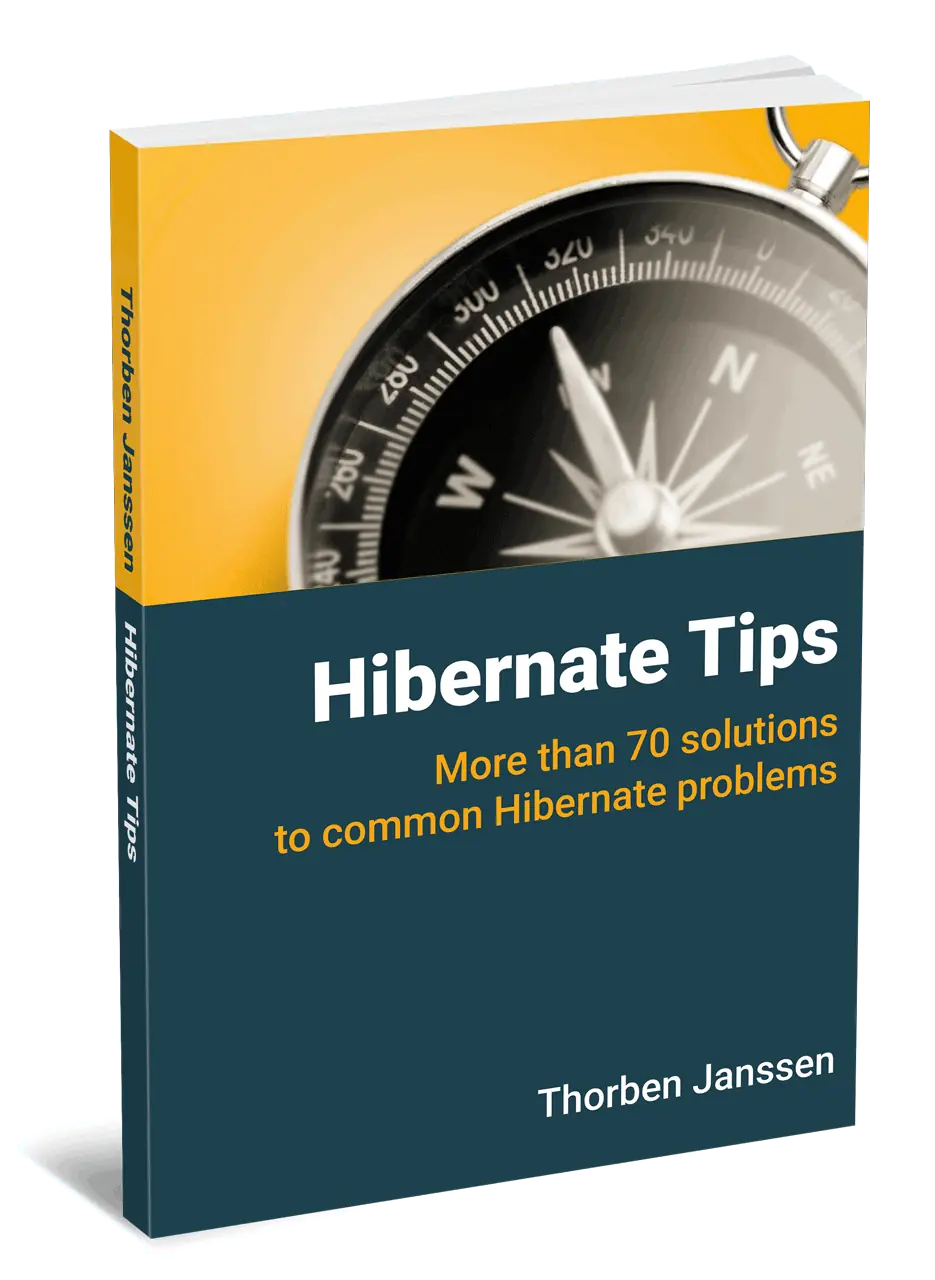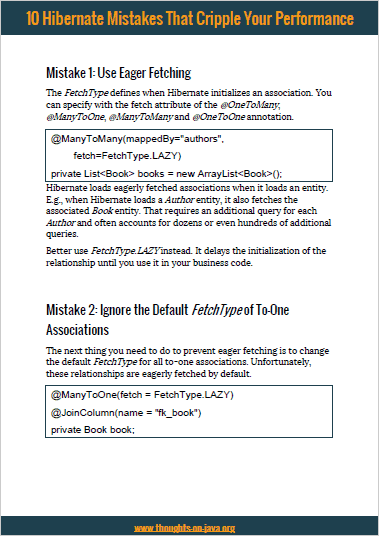Hibernate Tips: How to use a timestamp for versioning and optimistic locking
Take your skills to the next level!
The Persistence Hub is the place to be for every Java developer. It gives you access to all my premium video courses, monthly Java Persistence News, monthly coding problems, and regular expert sessions.
Hibernate Tips is a series of posts in which I describe a quick and easy solution for common Hibernate questions. If you have a question for a future Hibernate Tip, please leave a comment below.
Question:
My table model uses a timestamp instead of a numeric column for versioning. How can I use this column for Hibernate’s optimistic locking mechanism?
Solution:
The JPA specification supports numeric and timestamp columns for versioning. You can use the timestamp column in the same way as a numeric version column. You just need an entity attribute of java.util.Date and annotate it with @Version.
@Entity
public class Author {
@Version
private Date version;
...
}
Hibernate will retrieve the current time from the local JVM and use it to update the database column for each create or update operation.
13:44:49,494 DEBUG [org.hibernate.SQL] - select nextval ('hibernate_sequence')
13:44:49,551 DEBUG [org.hibernate.SQL] - insert into Author (dateOfBirth, firstName, lastName, version, id) values (?, ?, ?, ?, ?)
13:44:49,557 TRACE [org.hibernate.type.descriptor.sql.BasicBinder] - binding parameter [1] as [DATE] - [null]
13:44:49,558 TRACE [org.hibernate.type.descriptor.sql.BasicBinder] - binding parameter [2] as [VARCHAR] - [Thorben]
13:44:49,558 TRACE [org.hibernate.type.descriptor.sql.BasicBinder] - binding parameter [3] as [VARCHAR] - [Janssen]
13:44:49,559 TRACE [org.hibernate.type.descriptor.sql.BasicBinder] - binding parameter [4] as [TIMESTAMP] - [2017-08-07 13:44:49.519]
13:44:49,561 TRACE [org.hibernate.type.descriptor.sql.BasicBinder] - binding parameter [5] as [BIGINT] - [1]
But please be aware that this approach has a few drawbacks:
- The JVM usually doesn’t provide the timestamp with millisecond accuracy.
- Hibernate can’t detect 2 concurrent updates that are executed at the same millisecond.
- If you scale your application horizontally, you need to keep the timestamp of all instances in sync.
Get current time from the database
You can avoid drawback 2 and 3 by retrieving the version timestamp from your database. That is a Hibernate-specific feature that is not supported by all Hibernate Dialects and requires an additional database query. So, you shouldn’t use it, if you need to optimize your application for performance.
If you want to use this feature, you need to annotate your version attribute with an additional @Type annotation and set its type attribute to dbtimestamp
@Entity
public class Author {
@Version
@Type(type = "dbtimestamp")
private Date version;
...
}
As you can see in the log output, Hibernate now performs an additional query to retrieve the current time from the database.
13:45:54,997 DEBUG [org.hibernate.SQL] - select nextval ('hibernate_sequence')
13:45:55,019 DEBUG [org.hibernate.SQL] - select now()
13:45:55,052 DEBUG [org.hibernate.SQL] - insert into Author (dateOfBirth, firstName, lastName, version, id) values (?, ?, ?, ?, ?)
13:45:55,058 TRACE [org.hibernate.type.descriptor.sql.BasicBinder] - binding parameter [1] as [DATE] - [null]
13:45:55,059 TRACE [org.hibernate.type.descriptor.sql.BasicBinder] - binding parameter [2] as [VARCHAR] - [Thorben]
13:45:55,059 TRACE [org.hibernate.type.descriptor.sql.BasicBinder] - binding parameter [3] as [VARCHAR] - [Janssen]
13:45:55,060 TRACE [org.hibernate.type.descriptor.sql.BasicBinder] - binding parameter [4] as [TIMESTAMP] - [2017-08-07 13:45:54.999]
13:45:55,062 TRACE [org.hibernate.type.descriptor.sql.BasicBinder] - binding parameter [5] as [BIGINT] - [1]
Hibernate Tips Book

Get more recipes like this one in my new book Hibernate Tips: More than 70 solutions to common Hibernate problems.
It gives you more than 70 ready-to-use recipes for topics like basic and advanced mappings, logging, Java 8 support, caching, and statically and dynamically defined queries.


One Comment
Comments are closed.